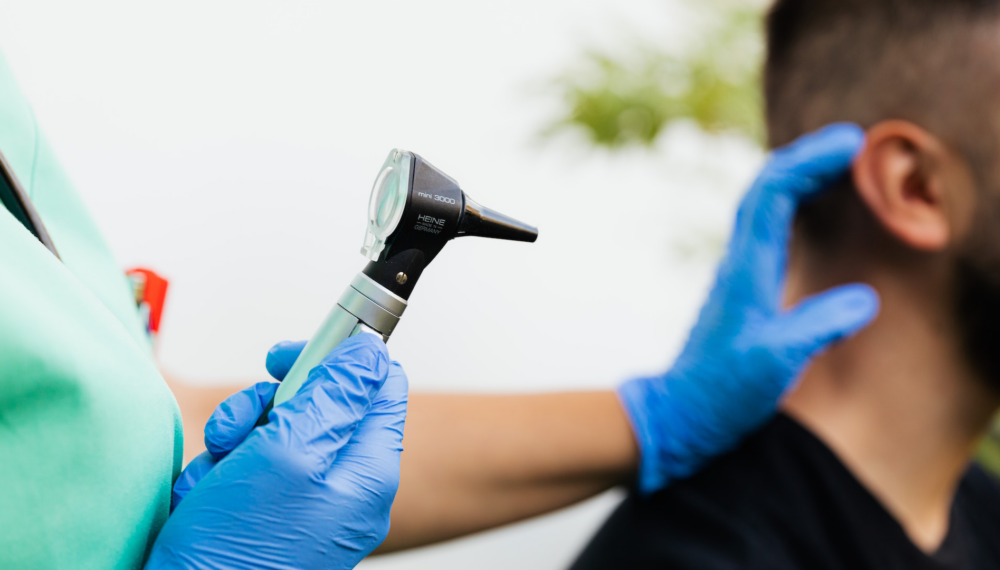Tinnitus and cochlear implants
About the process of having a cochlear implant and how it might affect your tinnitus
Cochlear implants are used to treat hearing loss. It is a delicate operation and it can take a while for your hearing to adjust afterwards. For most people, the implant can help to reduce existing tinnitus.
What is tinnitus?
Tinnitus is the sensation of hearing a sound when there is no external source for that sound. Someone with tinnitus may hear ringing, buzzing, hissing, whistling or other noises. The sensation can be there all the time or come and go. The volume of the noises heard can vary from one episode to the next.
Tinnitus is common and is reported in all age groups, even young children. About 30% of people will experience tinnitus at some point in their lives, and around 1 in 7 adults in the UK live with persistent tinnitus.
Tinnitus is more common in people who have hearing loss or ear problems. It is estimated that 80% of people with severe-profound hearing loss experience tinnitus.
What is a cochlear implant?
A cochlear implant is a small electronic device used to improve the hearing of people with severe-profound hearing loss who do not get enough benefit from hearing aids.
The implant system consists of two parts; the sound processor, which is worn externally like a hearing aid, and the cochlear implant itself which is surgically implanted in the inner ear (cochlea).
The small electronic device turns sound into tiny electrical pulses, which are sent directly to the nerve of hearing. The implant can therefore bypass some of the inner ear structures which are not working.
There are currently about 20,000 twenty thousand people in the UK with a cochlear implant.
Your GP, audiologist or ENT doctor can refer you for a hearing implant assessment. During a comprehensive assessment, the hearing implant team will discuss your hearing difficulties, test your hearing, and review your hearing aid settings.
The criteria for cochlear implants are set by the National Institute for Health and Care Excellence (NICE). The assessment process may be stopped at any time if you or the hearing implant team feel that it is not appropriate to continue.
Find more information about cochlear implants from your local audiologist and the British Cochlear Implant Group (BCIG).
Can a cochlear implant improve tinnitus?
The improvements in hearing and quality of life from a cochlear implant are well documented. Many studies also show an improvement in tinnitus following cochlear implantation. However, approximately 5% of people report their tinnitus becomes worse or they develop new tinnitus. Whilst many people do find that a cochlear implant improves their tinnitus, this cannot be guaranteed. If you are concerned about tinnitus you should talk to your implant team.

Tinnitus before implant surgery
During the implant assessment you will be asked about your tinnitus. If your tinnitus is particularly bothersome, your implant team may arrange an appointment with a tinnitus specialist.
For some people, anxiety about the implant operation can cause their tinnitus to seem worse. It can help to talk to someone using a cochlear implant who has already been through the experience.
Tinnitus between implant surgery and ‘switch on’
During the operation the surgeon slowly pushes the electrode array into the cochlea, which may bruise or damage some of the delicate structures of the inner ear. This can cause your hearing to temporarily get worse but will not affect the final outcomes with the cochlear implant once it is switched on.
Immediately after the surgery it is normal to experience changes in your hearing and tinnitus. It may become more or less noticeable, or the type of sound may change. Equally, you may not notice any changes.
After the surgery, you shouldn’t wear a hearing aid in the ear which has been operated on. As a result, you may be more aware of your tinnitus because of a reduction in external sound. Damaged cells may also send ‘false’ signals to the brain which you may hear as tinnitus.
Usually any new or increase in tinnitus will settle with time once the implant is ‘switched on’ and adjusted.
Tinnitus after ‘switch on’
After a cochlear implant is ‘switched on’ you will have several appointments to adjust the settings. This process is called ‘tuning’, ‘mapping’ or ‘programming’.
It will take time for your brain to get used to receiving the new signals every time a change is made to your settings. This can sometimes cause changes in tinnitus. Most people find their tinnitus settles once the settings of their cochlear implant have been finalised. If there is a sudden change in your tinnitus, please contact your implant team.
With the implant you will hear lots of new sounds that you may not have been able to hear with hearing aids. At the beginning it can be hard to tell the difference between environmental sounds and tinnitus. If you take the sound processor off and the sound is still there, this is likely to be tinnitus. If the sound disappears when you take the sound processor off it is probably an environmental sound which you are hearing through your cochlear implant.
Managing tinnitus
Although there’s no known cure for tinnitus, there are lots of things you can do to help manage tinnitus yourself. There’s lots more information in our What can I do section about relaxation, sleep and stress management.
We also have information about tinnitus and severe-profound hearing loss.
Talk to someone
If you are worried about tinnitus at any stage of your cochlear implant journey, please speak to a member of your implant team. This might be your surgeon, a nurse, audiologist or speech and language therapist. Finding out more about tinnitus, understanding all the factors that can increase your awareness of it and learning coping strategies can help you to manage the tinnitus. Some implant centres offer appointments with a tinnitus specialist. Other centres may refer you to a local audiology department.

Check your equipment
Most people find they hear their tinnitus less when their cochlear implant is switched on. If your new implant is not helping with your tinnitus or if you have had one for a while and something has changed, it is important to speak to your audiologist as they may need to review your settings. All cochlear implants have parts that need replacing regularly such as microphone filters and cables.
Tinnitus and sleep
Many people with a cochlear implant take off the sound processor at night. It can be unnerving to be able to hear less, especially if you are worried about missing sounds such as a child crying. Alarms and alerting systems may offer some reassurance. Feeling anxious about not hearing at night can increase awareness of tinnitus.
Whatever your level of hearing, you may notice your tinnitus more at night when it is quieter. The shift from a relatively noisy daytime environment to the quietness of the bedroom, can make it more noticeable. Having some background sound (known as sound enrichment) may help make your tinnitus less intrusive and allow you to sleep better.
Some people do wear their sound processor at night to help their tinnitus but this should only be done after talking to your audiologist.
We have lots of tips about different techniques to help when you have tinnitus and sleep disturbance.
Tinnitus and stress
Stress is often linked to tinnitus. Relaxing more may help you to feel less stressed so you’ll notice your tinnitus less. Relaxing your body (even if you do not feel tense) often helps with sleep and eases the tension caused by the tinnitus.
There are lots of relaxation activities that can be done with and without sound. For further advice see our pages on stress, relaxation techniques, and relaxation activities without sound.
If you have significant anxiety, depression, or other mental health problems alongside tinnitus, or are extremely troubled by the tinnitus you may benefit from psychological support or counselling. The implant team may be able to refer you directly, your GP can refer you, or you may be able to self-refer via your local Improving Access to Psychological Therapies (IAPT) service.
Key things to remember
- Tinnitus is common in people with severe-profound hearing loss.
- A cochlear implant’s primary goal is to improve hearing.
- Cochlear implants can improve tinnitus in some people, however there are also people whose tinnitus does not get better after cochlear implantation.
- Changes in tinnitus after surgery are common and are often short-lived.
- It takes time to get used to the implant – you may hear familiar sounds differently or you may hear sounds when you would normally expect it to be quiet.
- It is normal to feel tired or overwhelmed in the early stages of your implant journey, do not be hard on yourself. Speak to a member of your implant team or GP if you feel unable to manage.
Acknowledgements
The author would like to acknowledge the input and support of Mark Smith, Helen Cullington, Rachel Knappett and Amanda Compton Cook in the preparation of this leaflet.
Help and support
Our Tinnitus Support Team can answer your questions on any tinnitus related topics:
- Telephone: 0800 018 0527
- Web chat: – click on the icon
- Email: [email protected]
- Text/SMS: 07537 416841
We also offer a free tinnitus e-learning programme, Take on Tinnitus.
Version 1.1
Published November 2022
To be reviewed November 2025
Author: Gemma Crundwell, Cambridge University Hospitals NHS Foundation Trust
Images:
Otoscope photo by Karolina Grabowska on Pexels.
Doctor & patient photo by RODNAE Productions on Pexels.
